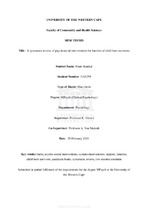A systematic review of psychosocial interventions for families of child burn survivors
Abstract
Burns are a major problem in Low-Income Countries (LIC) and Low-Middle Income Countries (LMIC). Children in LIC have been identified as a burn injury at-risk group. Individuals experience severe psychological and physical distress as a result of burn injuries. However, burns are a systemic problem and their impact is not limited to the individual but impacts the family system as a whole. Therefore, effective post burn interventions for families of child burn survivors are key in order to assist the child burn survivor’s well-being and recovery. The present study hopes to 1) address some of the gaps in knowledge in burn interventions for families of child burn survivors and 2) identify promising psychosocial interventions. A systematic review of literature was conducted that focused on identifying burn interventions for families of child burn survivors. These interventions were evaluated in order to establish which interventions showed promise. This systematic review was conducted following the guidelines of the PRISMA Statement for Systematic Reviews. An integrated quantitative and qualitative appraisal tool was used to review the identified studies. All the available English-medium literature between 1990 and 2019 was reviewed for this study. A literature search was performed in EBSCOhost, Academic Search Complete, PsychArticles, CINAHL plus, Medline, ERIC, SocIndex and Health Source: Nursing/Academic edition. Five studies were identified which included psychosocial interventions for families of child burn survivors. Of these studies only two were of quantitative nature and indicated sufficient evidence with regards to outcomes and efficacy. Three studies were of qualitative nature and indicated subjective evaluation measures to assess efficacy. Interventions identified included a family burns camp, a support group for parents, a support website, a parent participation program during acute paediatric burns management, and a teaching manual. All five studies indicated a degree of efficacy however, support groups in conjunction with psycho-education groups with systemic focus appeared to show the most promise. It is recommended that researchers focus on using quantitative measures in future intervention studies to assist in measuring efficacy. Furthermore, context specific interventions for LIC should be considered.

